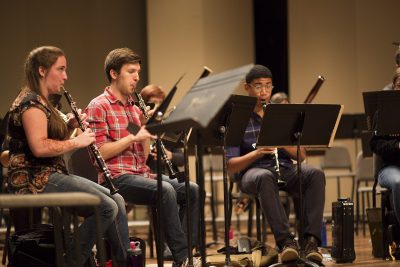
Boston University will restrict students who play brass or woodwind instruments in any college or club from performing in group ensembles due to COVID-19 guidance, according to College of Fine Arts School of Music’s Michael Barsano.
Barsano, director of university ensembles, wrote in an email that performers who are able to play without using their mouth — such as drummers and string instrument players — will still be allowed to perform as part of in-person group ensembles, but brass or woodwind musicians will not.
“Students who perform on woodwind and brass instruments will not be playing in groups at the Boston University Medical Advisory Group’s request,” Barsano wrote.
The CFA’s School of Music is “awaiting guidance” from the BU Medical Advisory Group, Barsano wrote, on whether they will allow wind instrumentalists to perform in group ensembles in the fall.
“For me, the most important thing is student safety,” Barsano said in an interview. “If the Medical Advisory Group believes that playing puts our students at risk or danger at all, then we have to abide by what they’ve ruled.”
Davidson Hamer, professor of global health and medicine and member of BU’s Medical Advisory Group, wrote in an email the advisory group was worried about coronavirus transmission through brass and woodwind instruments.
The strong exhalation of air needed to play woodwind and brass instruments, along with the confined nature of classrooms and rehearsal spaces, made the risk of spread a very probable danger, Hamer wrote, which required the removal of such instruments in group ensembles.
He added it would take only one musician with the virus playing these instruments to spread it throughout the ensemble.
“Bottom line is that we did this as a safety measure to prevent a potential outbreak of COVID-19 among band members,” Hamer wrote.
BU Pep Band manager and CFA senior Victoria Paspalas said 75 students in the pep band alone will be affected by not being able to play in the in-person group ensembles.
“I’m pretty gutted, to be completely honest,” Paspalas said. “As a senior, as a four-year member of the band, as one of those student leaders, it can be hard to accept that I’ve played my last performance and that we can’t even rehearse together in person anymore.”
To address this instrumental void, Paspalas said the pep band will introduce a “bucket drumming” ensemble — which will encourage musicians to focus on percussion — and will host online sessions for rhythm musicians.
“I think that we’re working with what we’ve got,” Paspalas said, “and we’re making the most of it.”
Band member and College of Engineering sophomore Nicholas Marchuk said the BU band followed many COVID-19 safety protocols and found itself restricted this semester.
“It feels like we’re sort of being punished for something we didn’t do,” Marchuk said. “It’s like they don’t care about us because we’re not generating money for the school like athletics is.”
Marchuk said the band had given up performing at sports games and other large events and were relegated to “small performances” last semester, but now they have been deprived of that as well.
“All of a sudden, they just get rid of us just to make it look like they’re making a difference in the case count,” Marchuk said. “It doesn’t make sense to me.”
BU Pep and BU Marching Band tuba player Kevin Reiss, a junior in the College of Arts and Sciences, said he was especially disappointed because playing in group ensembles was a driving factor in his choice to return to campus.
“I think what frustrates me the most is that it doesn’t seem to come from the people who are actually familiar with the science behind music-making,” Reiss said.
He added it seemed as though the band’s safety efforts in the Fall were not recognized by the administration.
“It’s coming from this high-in-the-sky faceless advisory board,” Reiss said, “who likely doesn’t appreciate all that we did last semester to mitigate the risk of spreading the virus.”
Reiss said he was skeptical wind-instrument playing was more dangerous in spreading COVID-19 than other activities, such as attending and speaking in class.
School of Music junior and Pep Band section leader Alex Birger said as a person who is majoring in music, this is a huge blow to his academic experience.
“Music is what I do, it’s what I want to do for a career,” Birger said. “As part of my academic studies, playing ensembles is like a lab for biologists.”
Birger said ensemble playing was not given the same priority as athletics programs, despite reported cases of COVID-19 on sports teams last semester. He added this may be motivated by financial reasons.
“There was no way the Medical Advisory Group approved sports and didn’t approve music,” Birger said.





























































































































